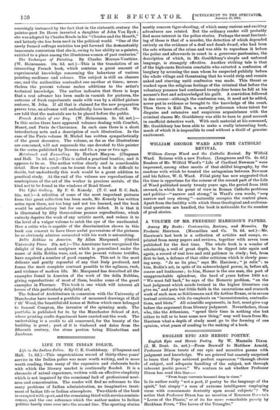LIFE IN THE INDIAN POLICE.
Life in the Indian Police. By C. E. Gouldsbury. (Chapman and Hall. 7s. 6d.)—This unpretentious record of thirty-three years' service in the Indian police was more worth writing, and is more worth reading, than many of the expensive and elaborate books with which the literary market is continually flooded. It is a chronicle of actual experience, written with an effective simplicity which is not impaired by the occasional lack of professional neat- ness and concentration. The reader will find no reference to the many problems of Indian administration, no imaginative treat- ment of Indian life or Indian atmosphere. Two-thirds of the book is occupied with sport, and the remaining third with service reminis- cences, and the one reference which the author makes to Indian politics barely runs over into the second line. The sporting stories mostly concern tiger-shooting, of which many curious and exciting adventures are related. But the ordinary reader will probably find more interest in the police stories. Perhaps the most fascinate• ing of these is that of a murder, the detection of which depended entirely on the evidence of a deaf and dumb dwarf, who had been the sole witness of the crime and was able to reproduce it before the police and afterwards in court in a gruesome pantomime, the description of which, in Mr. Gouldsbury's simple and unforced language, is strangely effective. Another striking tale is that of the high-caste Brahmin constable who extorted a confession of burglary by accusing the man whom he suspected publicly before the whole village and threatening that he would strip and remain naked and starving until confession was made. This threat so worked upon the religions feelings of the criminal that before the voluntary penance had continued twenty-four hours he fell at his accuser's feet and acknowledged his guilt. A conviction followed in due course—although the confession was, it need not be added, never put in evidence or brought to the knowledge of the court, Then there is Kali Das, a rascally policeman whose talent for disguise and extensive and suspicious acquaintance with the criminal classes Mr. Gouldsbury was able to turn to good account in unofficial detective work. With such material at his command, Mr. Gouldsbury has been able to make a really interesting book, much of which it is impossible to read without a thrill of genuine excitement.


























































 Previous page
Previous page